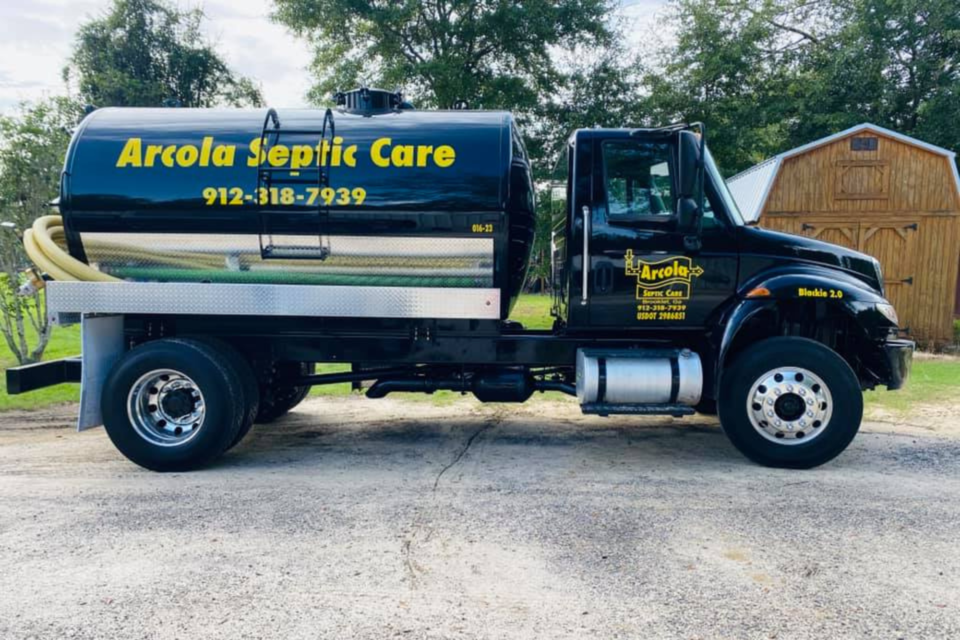Keith Hamilton, a third-generation septic contractor and owner of Arcola Septic Care, addressed the Bulloch County Board of Commissioners at their April 15, 2025 meeting with a passionate appeal for action on the county’s growing septic waste crisis. Drawing on his experience in the field and his background in chemistry and wastewater licensing, Hamilton laid out the scientific, legal, and practical realities that are making septic waste management increasingly unsustainable in Bulloch County.
“This is not quite dinner conversation,” Hamilton admitted early on, “but I’m very grateful for the opportunity to be able to share some information with you.”
Hamilton began by clarifying a key distinction at the heart of the problem: the difference between “sewage” and “septage.” He explained that while sewage is defined as “liquid, household waste from residential, commercial and industrial establishments,” septage is “a fluid mixture,” made up of “partially treated or untreated liquid sludge, human and domestic waste... pumped from septic tanks, malfunctioning on-site wastewater management systems, or privies.” He emphasized: “Sewage and septic are two entirely different things.”
That difference, Hamilton said, is also why most treatment plants refuse to take septic waste. “Once we try to dump septage into a sewage treatment plant, many sewage treatment plants won’t take it because it causes so many problems,” he told the board. He described the waste coming from septic tanks as “150 to 250 times more concentrated” than typical sewage, adding, “we generally think of it as being 200 times as concentrated.”
Beyond the high concentrations of nutrients and bacteria, Hamilton flagged a newer concern: pharmaceuticals—especially chemotherapy drugs. “The chemotherapy drugs are our biggest concern at this point,” he said, noting that pumpers may be exposed to “somewhere between 500 and 1,000 times what therapeutic doses are.”
Although Georgia law requires all septic waste to be disposed of at approved sites, Hamilton said local options are limited. “They’re required to be discharged into a Georgia DNR, EPD permitted facility,” he said, adding, “Not all Georgia EPD permitted wastewater facilities will accept septage. It’s at the discretion of the operator.” Of 27 facilities within reasonable distance, only six regularly accept septage, and some shut down intake during bad weather or capacity constraints. “I feel absolutely certain it goes on,” Hamilton said of illegal dumping.
According to estimates he shared, Bulloch County has approximately 58,000 septic tanks. “That’s only about 4%, that’s not very much,” Hamilton said, referring to the 2,500 that are pumped annually. “That would put us on the order of pumping 10,000 to 11,000 tanks a year,” he continued. “We don’t have the infrastructure to do that.”
Hamilton emphasized that more than 95% of the waste pumped in the county is transported to facilities outside of it, with pumpers depending on access to plants in Metter and Portal. “That’s only because of their good graces,” he said. “How long they will continue to do so, we do not know.”
As for solutions, Hamilton presented three options: build a septage-only treatment facility; build a full centralized wastewater plant that also accepts septage; or purchase capacity from Bryan County. The latter, he warned, would be the most expensive and least effective. “Bryan County will accept for treatment only domestic strength wastewater,” Hamilton said, quoting directly from the existing service agreement. “You’re going to pay to build something that you still don’t own.”
Instead, he proposed a lined lagoon and spray field system, modeled after facilities used in Portal and elsewhere. “We were looking around seven to $8 million to build a 500,000-gallon-a-day capacity system, exclusively for septage,” he said, referencing a pre-pandemic estimate. “And I would guesstimate that we can probably build one about $12, $13, maybe $14 million.” He stressed: “There are no free rides,” noting that disposal fees—not taxpayer subsidies—would fund the system.
Additional discussion confirmed that the strain on existing facilities becomes especially problematic during wet weather or major holidays, when septic failures spike and facilities often shut down. Without access to disposal, pumpers are left with limited options. “When they shut them down, pretty much everybody in Bulloch County’s out of business with the septic tank unless you go illegal—because there’s nowhere for it to go,” Commissioner Timmy Rushing explained.
The group acknowledged that new subdivisions relying on septic systems are being approved regularly, further increasing the need for sustainable waste management. There was agreement that any future site should be centrally located to reduce unfair costs on either end of the county.
Rather than forming a formal committee, which would trigger Open Meetings Act requirements, Chairman David Bennett agreed to move forward informally to explore options to address this issue. Stakeholders from the health department, EPD, and local businesses will be brought together to explore options and bring back recommendations.
Hamilton concluded his remarks by urging the board to think long-term. “I’m not asking you to spend $30 million or $100 million,” he said. “I’m not asking you to do this for my company, for me personally, or for any other benefit.” His request was simple: “Do not Nancy Reagan this. Do not simply say no. Make an informed decision.”
He finished by calling on county leadership to take a stewardship approach. “The county you and I grew up in, is gone. We’ve got to make the most of what the future is.”




